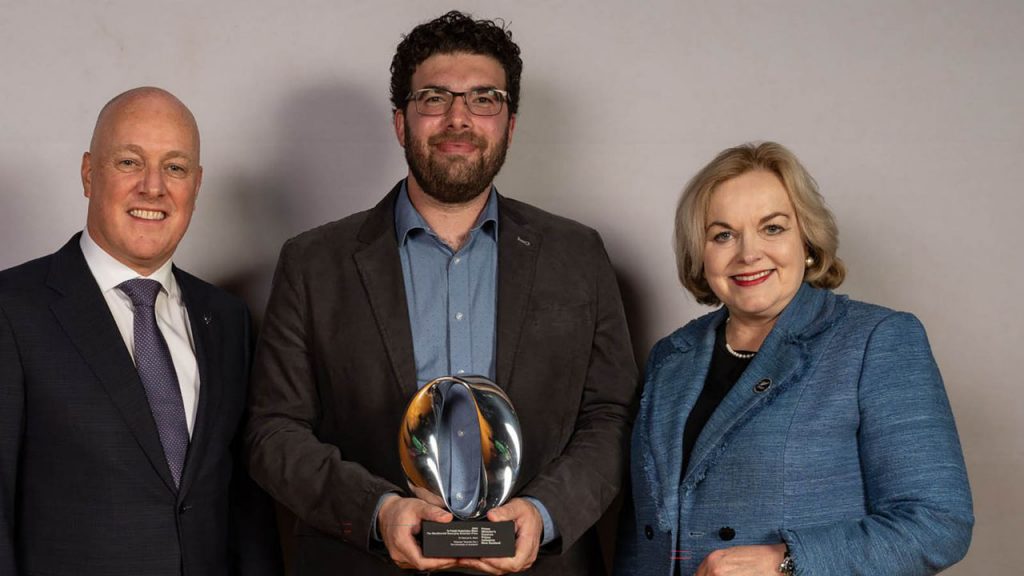Science
Cognitive Scientist Warns of Brain Drain Due to Funding Cuts

Cognitive scientist Samuel Mehr, who received New Zealand’s prestigious science prize in 2022, has issued a stark warning about the country’s declining research environment. He argues that unless the “laughably pathetic” science funding system is overhauled, New Zealand risks losing its most talented researchers to overseas opportunities.
In a candid assessment, Mehr stated that the past decade has seen New Zealand’s reputation as an innovation hub steadily deteriorate. He emphasized that recent restructures and funding cuts have only exacerbated the situation, leading to a significant exodus of top minds. “If things don’t change, we will continue to see a brain drain,” he remarked.
The concerns raised by Mehr are not unfounded. According to a report from Research, Science and Innovation, funding for scientific research in New Zealand has stagnated, with government allocations failing to keep pace with inflation and growing operational costs. This decline in financial support has led to increased difficulties for researchers seeking to secure grants and resources necessary for groundbreaking work.
Consequences of Underfunding
The implications of inadequate funding are profound. New Zealand’s ability to attract and retain skilled researchers is critical for its economic and social development. As Mehr pointed out, the loss of these individuals not only hampers scientific progress but also diminishes the country’s competitive edge in the global research landscape.
Recent studies reveal a troubling trend: over the last ten years, many leading experts in various scientific fields have relocated to countries with more robust funding frameworks. This migration has raised alarms among academics and policymakers alike, who fear that New Zealand may struggle to recover its former status as a leader in innovation.
The situation has become increasingly dire, with prominent institutions like Victoria University of Wellington and The University of Auckland reporting difficulties in attracting high-caliber talent. This trend is particularly concerning given the vital role that research plays in addressing pressing global challenges, from climate change to public health crises.
Calls for Reform
In response to these challenges, Mehr is advocating for a comprehensive review of New Zealand’s science funding system. He believes that a proactive approach is essential to reinvigorate the research community and ensure that the country remains competitive on the world stage. “We need a system that supports innovation and research at every level,” he said.
The scientist also highlighted the importance of investing in young researchers and providing them with the necessary tools to succeed. By fostering an environment that encourages creativity and exploration, New Zealand can begin to reverse the trend of brain drain that has plagued its scientific community.
As discussions around funding reform continue, the urgency of the situation cannot be overstated. Without immediate action, New Zealand risks losing not only its brightest minds but also its future potential for scientific advancement. The call for change is clear, and the time for dialogue and action has arrived.
-

 World3 months ago
World3 months agoTest Your Knowledge: Take the Herald’s Afternoon Quiz Today
-

 Sports3 months ago
Sports3 months agoPM Faces Backlash from Fans During Netball Trophy Ceremony
-

 Lifestyle3 months ago
Lifestyle3 months agoDunedin Designers Win Top Award at Hokonui Fashion Event
-

 Sports3 months ago
Sports3 months agoLiam Lawson Launches New Era for Racing Bulls with Strong Start
-

 Lifestyle3 months ago
Lifestyle3 months agoDisney Fan Reveals Dress Code Tips for Park Visitors
-

 Health3 months ago
Health3 months agoWalking Faster Offers Major Health Benefits for Older Adults
-

 World3 months ago
World3 months agoCoalition Forms to Preserve Māori Wards in Hawke’s Bay
-

 Politics3 months ago
Politics3 months agoScots Rally with Humor and Music to Protest Trump’s Visit
-

 Top Stories3 months ago
Top Stories3 months agoUK and India Finalize Trade Deal to Boost Economic Ties
-

 Entertainment3 months ago
Entertainment3 months agoExperience the Excitement of ‘Chief of War’ in Oʻahu
-

 World3 months ago
World3 months agoHuntly Begins Water Pipe Flushing to Resolve Brown Water Issue
-

 Science3 months ago
Science3 months agoNew Interactive Map Reveals Wairarapa Valley’s Geological Secrets









